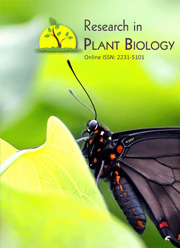EFFECT OF INOCULATION METHODS OF BIOZOTE-MAX (PLANT GROWTH PROMOTING RHIZOBACTERIA-PGPR) ON GROWTH AND YIELD OF RICE UNDER NATURALLY SALT-AFFECTED SOIL
DOI:
https://doi.org/10.25081/ripb.2017.v7.3602Abstract
A field experiment was carried out at the experimental farm of Soil Salinity Research Institute, Pindi Bhattian during 2016-17 to assess evaluate different Rhizobial inoculation methods on growth and yield of rice (Oryza sativa) cv. Basmati-385 under naturally salt-affected soil (pH= 8.12, ECe= 7.88 dS m-1and SAR=24.96). Seeds of rice were inoculated with Biozote–Max (Plant Growth Promoting Rhizobacteria-PGPR) produced in Soil Biology and Biotechnology Research Programme of Land Resources Research Institute, National Agricultural research Centre (NARC), Islamabad under PARC-Agrotech. Company (Pvt) Ltd. NARC, Islamabad in three ways i.e. rice seeds inoculated for direct seeding and nursery and dipping seedling roots in the solutions of these rhizobial strains comparable of control un-inoculated (control) by each inoculation method. The performances of Rhizobial strain Biozote–Max used as seed and seedling root dipping inoculation were superior to uninoculated control in all the parameters of the rice crop. Among the treatments, seed and seedling root dipping inoculation with Rhizobial strain Biozote–Max performed best in recording plant height, panicle length, number of tillers, 1000-grain weight and grain yield of rice crop. Maximum tillering was observed with all strains under different inoculation methods. Although, the strains performed better as compared to control, however, dipping of nursery roots produced significantly higher yield followed by seed inoculation for direct seeding. Overall, among all the inoculation methods seedling root dipping produced comparable paddy yield. The highest paddy yield (367 g m-2) was harvested with SBCC (M8) seed inoculation which was 13% more than that of un-inoculated (control).



 .
. 